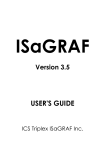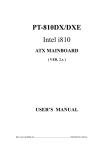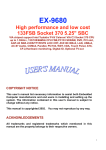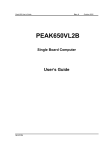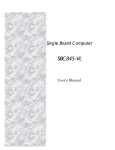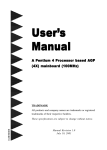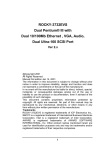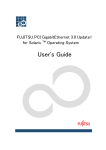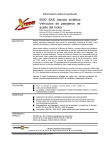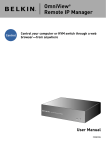Download User`s Manual - BCM Advanced Research
Transcript
NEX 6320A User's Guide Rev. B0 NEX 6320A ATX Industry Server Board User′′s Guide NEXCOM 0900 NEX 6320A User's Guide Rev. B0 0900 @Copyright 2000 All Rights Reserved Manual edition 1, September 2000 The information in this document is subject to change without prior notice in order to improve reliability, design and function and does not represent commitment on the part of the manufacturer. In no event will the manufacturer be liable for direct, indirect, special, incidental, or consequential damages arising out of the use or the possibility of such damages. This document contains proprietary information protected by copyright. All rights are reserved. No part of this manual may be reproduced by any mechanical, electronic, or other means in any form without prior written permission of the manufacturer. Trademarks NEX 6320A is registered trademarks of NEXCOM Co., Ltd., and IBM PC is a registered trademark of International Business Machines Corporation. Intel and Pentium are registered trademarks of Intel Corporation. Award is a registered trademark of Award Software, Inc. Other product names mentioned herein are used for identification purposes only and may be trademarks and/or registered trademarks of their respective companies. NEXCOM NEX 6320A User's Guide Rev. B0 0900 How to use this guide This manual is written to help you use NEX 6320A. It describes how to arrange various settings on the board to meet your requirements. It is briefed as follows: Chapter 1, “Introduction” gives an overview of the product‘s specifications. included in the product package. It also tells you what are Chapter 2, “Switches and Connectors” describes the definitions and positions of Jumpers and Connectors that you may easily configure and set up per your requirement. Chapter 3, “Capability Expanding” describes how to change or expand the Board by changing the system memory and CPU to get more power out from the board. Chapter 4, “Award BIOS Setup” describes how to use the advanced PCI/Green BIOS to control almost every feature of the NEX 6320A The Appendix 1 describes how to set up the Watch Dog Timer (WDT) and gives an example to program the WDT. NEXCOM NEX 6320A User's Guide Rev. B0 0900 Contents CHAPTER 1 INTRODUCTION ........................................................................................ 1-1 1-1 Specifications..........................................................................................................................1-2 1-2 What you'll have from the package.......................................................................................1-6 CHAPTER 2 SWITCHES AND CONNECTORS.............................................................. 2-1 2-1 Main Board Layout .................................................................................................................2-1 2-2 Switches ..................................................................................................................................2-2 2-3 Connectors ..............................................................................................................................2-5 CHAPTER 3 CAPABILITY EXPANDING ........................................................................ 2-6 3-1 System Memory ......................................................................................................................3-1 CHAPTER 4 AWARD BIOS SETUP ............................................................................... 4-1 4-1 BIOS Setup ..............................................................................................................................4-1 Entering Setup..................................................................................................................................4-1 Control Keys.....................................................................................................................................4-2 Getting Help .....................................................................................................................................4-3 The Main Menu ................................................................................................................................4-4 Standard CMOS Features................................................................................................................4-6 Advanced BIOS Features Setup Menu ............................................................................................4-9 Advanced Chipset Features Setup Menu ......................................................................................4-13 Integrated Peripherals ....................................................................................................................4-16 Power Management Setup.............................................................................................................4-18 PnP/PCI Configuration ...................................................................................................................4-22 PC Health Status............................................................................................................................4-24 Frequency/Voltage Control ............................................................................................................4-25 Supervisor/User Password Setting ................................................................................................4-26 Power-On Boot...............................................................................................................................4-27 4-2 BIOS Reference - POST Message .......................................................................................4-28 POST Beep ....................................................................................................................................4-28 Error Messages..............................................................................................................................4-28 4-3 BIOS Reference - POST Codes............................................................................................4-32 APPENDIX ........................................................................................................................ I Appendix A Watch Dog Timer.................................................................................................................. i Content NEX 6320A User's Guide Chapter 1 Rev. B0 0900 Introduction Welcome to the NEX 6320A ATX Dual Socket 370 Celeron/Pentium III AIO Main Board. The NEX 6320A is a full function ATX main board with VGA, Dual LAN, Dual SCSI and other enhanced I/O interfaces. This NEX 6320A supports Intel Dual Pentium III up to 66/100/133 FSB MHz up to 1 GHz CPU clock. Memory accepts up to 1GB SDRAM and 4 DIMMs on board. It equips on board C&T 69000 VGA controller with 2MB on die supporting CRT and Panel and provides dual Intel 82559 Ethernet controllers. In addition, it offers Adaptec AIC 7899 dual channel Ultra 160 SCSI controller. Providing dual-channel Ultra/160m SCSI and dual Ethernet ports on board, the NEX 6320A meets the requirement of the ISP servers without slots expansion. The major feature summarize as follow: 1. Dual Pentium III FC-PGA support, 66/ 100 / 133 MHz FSB, up to 1 GHz CPU clock. 2. Memory up to 1 GB SDRAM, all ECC support, 4 DIMMs on board. 3. On board VGA with 2 MB on die, CRT and Panel support. C&T 69000 single chip VGA. 4. On board Dual 10/ 100 baseTX Ethernet ports, Intel 82559 Ethernet controller x 2. 5. On board Dual-channel Ultra/160m SCSI, Adaptec 7899 SCSI controller. 6. On board PCI bridgex1, Intel 21150 PCI bridge controller. 7. Expansion slots: PCIx5, ISAx1, 2X AGP slotx1. 2 8. 2S1P, FDCx1, IDEx2 with power header for DOM, Watch Dog Timer, I C, GPIO, RTC….,etc. Features vs. Form Factor With rich features including LAN, SCSI and VGA on board, the NEX 6320A could be used in the 1U/2U chassis for Internet/Intranet Web servers now in high demand in the market. The NEX 6320A offers dualchannel Ultra/160m SCSI and dual LAN ports on board meeting the requirement of the ISP servers without slots expansion. Moreover, all these features could be put into a 1U chassis. The NEX 6320A is the smallest all-in-one DP server board in its kind. Following the rigid standards of the ATX form factors, The NEX 6320A would be the best choice for any ATX compliant chassis or container. The NEX 6320A series are created for the PC chassis from desktop to big tower, for the rack mount chassis from 1U to 10U. NEXCOM bring the industrial grade servers with the popular form factors for all the users requiring rock-solid reliability and space efficient. Introduction 1-1 NEX 6320A User's Guide Rev. B0 0900 1-1 Specifications System Architecture Standard ATX form factor with dual Pentium III CPU support AIO board with dual channel Ultra 160 SCSI, dual channel Ethernet and VGA Next generation sever with industry specificatio CPU Support Intel Dual Celeron/Pentium III (Coppermine process) CPU with 128/256K cache on die Brand New Socket 370 FC-PGA CPU running at 66/100/133MHz FSB up to 933MHZ+ Support streaming SIMD instruction Main Memory Support SDRAM up to 1GB (Max.) 168 pin DIMM socket ×4 ECC support (single bit error correction/Multiple bit errors reporting) BIOS Award System BIOS Plug & Play support Advanced Power Management support Advanced Configuration & Power Interface support Jumperless for CPU FSB 2M bits flash ROM, upgradeable to 4M bits Chip Set Intel 440BX AGP set 66/100/133MHz FSB support PCI V2.1 complied Optimized SDRAM support Introduction 1-2 NEX 6320A User's Guide Rev. B0 0900 On Board VGA C&T 69000 VGA controller (PCI mode) 2MB SDRAM on die Maximum Res. Color & Refresh Rate Resolution Colors Refresh Rate (Hz) 1280×1024 256 60 1024×768 16bits (High color) 85, 75, 60 800×600 24bits (True color) 85, 75, 60 Drivers support:Windows 95/98/2000, Windows NT4.0 On Board LAN Intel 82559 Single Ethernet controller × 2 10 Base T/100 Base TX support, full duplex Complied with PCI V2.1, IEEE802.3, IEEE 802.3U Drivers support:DOS/Windows, Windows 95/98/2000, Windows NT4.0, Netware, SCO Open Server 5.0, Linux Rear Panel 4 LAN LED (active/link ×2, speed ×2) On Board SCSI Adaptec AIC 7899 dual channel Ultra 160 SCSI controller Brand New Ultra 160 SCSI support 80MB/s (Max.) transfer rate, up to 12 meter cable Backward compatible with Ultra Wide SCSI, SCSI II, etc. Drivers support:Windows 95/98/2000, Windows NT4.0, SCO Open Server 5.0 68 pin SCSI connector × 2 On board 4 pin header for LED On Board I/O Winbond W83977 Super I/O on board SIO × 2, with 2 × 16C550 UARTs PIO × 1, Bi-directional, EPP/ECP support Floppy Disk controller:5.25″ 360KB/1.2MB, 3.5″ 720KB/1.2MB/1.44MB/2.88MB support, 34 pin connector × 1 On chip enhanced IDE × 2, PIO up to mode 4, DMA master up to mode 2, Ultra DMA/33 support, total 4 E.IDE Devices support, 40 pin connector × 2 On chip keyboard, mouse controller On board USB port × 2 On board buzzer × 1 Introduction 1-3 NEX 6320A User's Guide Rev. B0 0900 IrDA connector × 1 2 On board 2 pin header for I C On board reserved 4 in/4 out digital I/O On board 2 pin header for reset SW, 4 pin for speaker, 5 pin for keylock and power LED ACPI Function Soft off Wake On LAN Wake On Keyboard Wake On Ring RTC alarm wake up On Board Slot Total 6 slots, include AGP slot ×1, ISA slot ×1, PCI slot ×5 (reserved 1 horizontal PCI slot expand for 1U chassis, 2 or 3 horizontal PCI slot expand for 2U chassis) On Board RTC High precision real time clock/calendar with battery back up IDE interface Disk On Module support On board reserved power pin for DOM (DiskOnModule):4MB~160MB, etc System Monitor Winbond W83782D system monitor controller Eight voltage (For +3.3V, +5V, 5V STBY, +12V, −12V, Vtt and Vcore ×2) Two Fan speed (For CPU) Two temperature (For CPU) Drivers support:Windows 95/98, Windows NT4.0/2000 Power Input ATX power connector ×1 Back Panel PS2 connector × 2 (for Keyboard/Mouse) USB port × 2 RJ45 connector × 2 (for LAN) 15 pin D-type connector × 1 (for VGA) 9 pin D-type connector × 2 (for SIO) 25 pin D-type connector × 1 (for PIO) LAN LED × 4 (active/link × 2, speed × 2) Introduction 1-4 NEX 6320A User's Guide Rev. B0 0900 Watchdog Timer 1,2,4…64 seconds time-out intervals Dimensions Dimensions:305mm(L) x 244mm(W) Power Requirements +3.3V:10A +5V:20A +12V:500mA 5VSTBY:1A Environments Operating temperatures:0°C to 60°C Storage temperatures:-20°C to 80°C Relative humidity:10% to 90% (Non-condensing) Certification CE approval FCC Class A Model Available NEX 6320A -- ATX Dual Socket 370 Celeron/Pentium III AIO Main Board NEX 6320VL2-- ATX Dual Socket 370 Celeron/Pentium III Main Board w/VGA/Dual LAN NEX 6320 -- ATX Dual Socket 370 Celeron/Pentium III Main Board Introduction 1-5 NEX 6320A User's Guide Rev. B0 0900 1-2 What you'll have from the package In addition to this manual, the NEX 6320A package includes the following items ITEM Model NEX 6320A NEX 6320VL2 NEX 6320 NEX 6320 series ATX Server Board 1 1 1 Cable Set for IDE & FDD cable 1 1 1 Optional X X Quick reference guide sticker 1 1 1 Driver CD (User manual included) 1 1 1 Rear I/O Gasket 1 1 1 SCSI Cable If any of these items is missed or damaged, please contact your vendor for what you want Introduction 1-6 NEX 6320A User's Guide Chapter 2 Rev. B0 0900 Switches and Connectors 2-1 Main Board Layout This chapter gives the definitions and shows where to locate the positions of switches and connectors. Switches and Connectors 2-1 NEX 6320A User's Guide Rev. B0 0900 2-2 Switches Switches on the CPU board are used to select options for different functions used. to accommodate the variations of the following table. The switch-on or off is Switch Setting Table (*: default setup) Host Bus Frequency S4.1 S4.2 S4.3 66 / 60 MHz ON ON ON * 100 /133 MHz OFF OFF ON CPU Clock PCI Clock S4.4 S4.5 * 100MHz 33MHz OFF ON 66MHz 33MHz ON ON 133MHz 33MHz OFF OFF CPU Clock Frequency CPU Type * Pentium III (Coppermine) S5.1 Celeron ON S5.2 OFF S5.3 ON S5.4 OFF S5.1 OFF S5.2 ON S5.3 OFF S5.4 ON On Board SCSI Active Terminal Resistor * Auto Always Enable Channel A S7.1 OFF ON Channel B S7.2 OFF ON Switches and Connectors 2-2 NEX 6320A User's Guide COM2 Mode Rev. B0 0900 ( RS 232 / 422 / 485 ) S2.1 S2.2 S2.3 S2.4 S2.5 S2.6 S2.7 S2.8 S3.1 S3.2 S3.3 * RS232 OFF ON OFF ON OFF ON OFF ON ON OFF OFF RS422 ON OFF ON OFF ON OFF ON OFF OFF ON OFF RS485 ON OFF ON OFF ON OFF ON OFF OFF OFF ON On Board VGA Enable S3.7 *Enable Disable OFF ON * Enable Disable LAN1 / LAN2 Enable LAN1 S1.1 OFF ON LAN2 S1.2 OFF ON Disable * Normal ON OFF Clear * Normal ON OFF * Enable Disable ON OFF KEYBOARD Password On S3.6 Clear CMOS Memory S3.4 BIOS Flash-able S3.5 Switches and Connectors 2-3 NEX 6320A User's Guide Rev. B0 0900 Multiplier of CPU Frequency ( Only for Intel CPU Engineer Sample ) Multiplier S6.1 S6.2 S6.3 S6.4 X2 ON ON ON ON X3 ON OFF ON ON X4 OFF ON ON ON X5 OFF OFF ON ON X2.5 ON ON OFF ON X3.5 ON OFF OFF ON X4.5 OFF ON OFF ON X5.5 OFF OFF OFF ON X6 ON ON ON OFF X7 ON OFF ON OFF X8 OFF ON ON OFF Reserved OFF OFF ON OFF X6.5 ON ON OFF OFF X7.5 ON OFF OFF OFF X1.5 OFF ON OFF OFF X0.5 OFF OFF OFF OFF Switches and Connectors 2-4 NEX 6320A User's Guide Rev. B0 0900 2-3 Connectors Jumper/Connector Define Connector Function Pin No. Description Rear Panel Connectors / LED J1 Upper / Lower LAN2 / LAN1 RJ45 Connector. J2 Upper / Lower COM2 / COM1 D sub connector 1 TXO+ 2 TXO- 3 RXI+ 4 TERMPLANE 5 TERMPLANE 6 RXI - 7 TERMPLANE 8 TERMPLANE RS323 Mode RS422/485 Mode 1 Data Carrier Detect (DCD) TXD- ( 2 Receive Data (RXD) TXD+ Note 1) 3 Transmit Data (TXD) RXD+ 4 Data Terminal Ready (DTR) RXD- 5 GND GND 6 Data Set Ready (DSR) Not Define 7 Request to Send (RTS) Not Define 8 Clear to Send (CTS) Not Define 9 Ring Indicator (RI) Not Define J3 Upper / Lower Parallel Port / VGA D sub connector. Switches and Connectors Pin No: Upper, Parallel Port D sub connector Lower, VGA connector. 1 Strobe# RED 2 Data 0 GREEN 3 Data 1 BLUE 4 Data 2 N/C 5 Data 3 GND 6 Data 4 GND 7 Data 5 GND 8 Data 6 GND 9 Data 7 +5V 10 Acknowledge GND 2-5 NEX 6320A User's Guide Connector Rev. B0 Function J4 Upper / Lower USB2 / USB1 connector. J5 Upper / Lower Mouse / Key Board Mini DIM connector. D1 (with four LED ) LAN1 / LAN2 Link / Active LED Switches and Connectors Pin No. 0900 Description 11 Busy N/C 12 Paper Empty Display Data Channel data 13 Printer Select Horizontal Sync 14 Auto Form Feed# Vertical Sync 15 Error# Display Data Channel clock 16 Initialize 17 Printer Select IN# 18 GND 19 GND 20 GND 21 GND 22 GND 23 GND 24 GND 25 GND 1 +5V 2 USB DATA- 3 USB DATA+ 4 GND Upper Mouse Lower Key Board 1 Mouse Data KB/DATA 2 N/C MS/DATA 3 GND GND 4 +5V +5V 5 Mouse Clock KB/CLK 6 N/C MS/CLK LED1 LAN1 Link / Active: Shining while Link / Glitter while Active LED2 LAN1 Speed: 10/100 M bits. Shining while 100 Mb LED3 LAN2 Link / Active: Shining while Link / Glitter while Active LED4 LAN2 Speed: 10/100 M bits. Shining while 100 Mb 2-6 NEX 6320A User's Guide Connector Rev. B0 Function Pin No. 0900 Description Internal Connector J100 JP2 JP3 LAN1/LAN2 Extend Link / Active LED connector. Key Board 5 Pin JST connector IR connector. 1 LAN1 Active 2 LAN1 Link 3 330 Ω Pull Hi to 3.3V 4 LAN1 Speed 5 LAN2 Active 6 LAN2 Link 7 330 Ω Pull Hi to 3.3V 8 LAN2 Speed 1 Keyboard Clock 2 Keyboard Data 3 N/C 4 GND 5 +5V 1 5V 2 NC 3 IRRX 4 GND 5 IRTX J13 ISA Slot. J8, J9, J10, J11,J12 PCI Slot. U22 2X AGP Slot. JP4 System Thermometer 1 sensor connector. 2 Temperature sensor System Fan connector. 1 GND 2 +12V 3 Sense 1 GND 2 +12V 3 Sense J101 J7 / J14 CPU.1 / CPU.2 Fan connector. Switches and Connectors GND 2-1 NEX 6320A User's Guide Connector J6 JP11 J22 JP10 J25 Rev. B0 Function ATX Power input connector. Keyboard Lock. Speaker Connector. Button On/Off. Hardware reset. Switches and Connector Pin No. 0900 Description 1 +3.3V 2 +3.3V 3 GND 4 +5V 5 GND 6 +5V 7 GND 8 PS Power ok 9 Stand By +5V 10 +12V 11 +3.3V 12 -12V 13 GND 14 PS Power On 15 GND 16 GND 17 GND 18 -5V 19 +5V 20 +5V 1 VCC 2 N/C 3 GND 4 Key-Board lock 5 GND 1 Speaker Signal 2 GND 3 GND 4 +5V 1 Stand By 3.3V 2 Power Button 1 Reset 2 GND 2-1 NEX 6320A User's Guide Connector Rev. B0 Function J18 / J19 SCSI Port A / Port B connector. JP15 SCSI LED connector. J16 FDD connector. Switches and Connector Pin No. 0900 Description 1 200 Ω 2 SCSI Port A LED 3 200 Ω 4 SCSI Port B LED 1 GND 2 Density Select bit 0 3 GND 4 N/C 5 N/C 6 Density Select bit 1 7 GND 8 Index# 9 GND 10 Motor Enabled A# 11 GND 12 Drive Select B# 13 GND 14 Drive Select A# 15 GND 16 Motor Enable B# 17 GND 18 Direction# 19 GND 20 Step# 21 GND 22 Write Data# 23 GND 24 Write Gate# 25 GND 26 Track 0# 27 GND 28 Write Protect # 2-2 NEX 6320A User's Guide Connector J23 / J24 Rev. B0 Function Primary / Secondary IDE Channel connector. Switches and Connector Pin No. 0900 Description 29 N/C 30 Read Data# 31 GND 32 Head Side Select# 33 N/C 34 Disk Change# 1 Reset# 2 Ground 3 Data 7 4 Data 8 5 Data 6 6 Data 9 7 Data 5 8 Data 10 9 Data 4 10 Data 11 11 Data 3 12 Data 12 13 Data 2 14 Data 13 15 Data 1 16 Data 14 17 Data 0 18 Data 15 19 Ground 20 N/C 21 DMA REQ 22 Ground 23 IOW# 24 Ground 25 IOR# 26 Ground 27 IOCHRDY 28 N/C 2-3 NEX 6320A User's Guide Connector J12 / J13 Rev. B0 Function 5V Power connector for Disk On Module. J15 / J17 / J20 / DIMM 1 / DIMM2 / J21 DIMM3 / DIMM4 socket. Pin No. Description 29 DMA ACK 30 Ground 31 Interrupt 32 N/C 33 SDA 1 34 N/C 35 SDA 0 36 SDA 2 37 HDC CS1# 38 HDC CS3# 39 HDD Active# 40 Ground 1 +5V 2 GND 1 Input 2 Input JP8 General Purpose Input Port connector. Note2 JP9 General Purpose Output Port connector. Note3 JP14 HDD Active LED. Switches and Connector 0900 1 +5V 2 ACTIVE# 2-4 NEX 6320A User's Guide Rev. B0 0900 Note 1 Lower, COM1 (RS232) D sub connector PIN No. Description 1 Data Carrier Detect (DCD) 2 Receive Data (RXD) 3 Transmit Data (TXD) 4 Data Terminal Ready (DTR) 5 GND 6 Data Set Ready (DSR) 7 Request to Send (RTS) 8 Clear to Send (CTS) 9 Ring Indicator (RI) Note2 JP8: General Purpose Input. Pin NO. Pin Define Mapping to PIIX4 Ball NO. 1 General Purpose Input L2 / GPI 13 2 GND 3 General Purpose Input 4 GND 5 General Purpose Input 6 GND 7 General Purpose Input 8 GND J3 / GPI 14 L5 / GPI 15 K3 / GPI 16 Note3 JP9: General Purpose Output Pin NO. Pin Define Mappings to PIIX4 Pin define / Ball NO. 1 General Purpose Output G4 / GPO 0 2 GND 3 General Purpose Output 4 GND 5 General Purpose Output 6 GND 7 General Purpose Output 8 GND T19 / GPO 8 G5 / GPO 27 F2 / GPO 28 This page is intentionally left blank Switches and Connector 2-5 NEX 6320A User's Guide Rev. B0 0900 . Switches and Connector 2-6 NEX 6320A User's Guide Chapter 3 Rev. B0 0900 Capability Expanding This chapter explains how you can expand capability of your CPU board in such aspects as system memory and CPU. 3-1 System Memory This ATX Server support 4 slots for 168-pin 3.3V Non-buffered DIMM modules, providing support for up to 1GB of main memory using DIMM modules from 8MB to 256MB. The following is the example to install the system SDRAM memory module combination: if you have two DIMM Modules, you has better install them into DIMM Slot 1 & Slot 2 with the Max possible memory size up to 512MB ( 256 + 256 ) if the 256MB DIMM module is available. Note: It is highly recommended to use the PC-100 or PC-133 Spec. DIMM module Q’ty of Module DIMM1 DIMM2 DIMM3 1 1 st 2 1 st 2 nd 3 1 st 2 nd 3 rd 4 1 st 2 nd 3 rd DIMM4 4th Module Size Max. Size 8~256 MB 256 MB 8~256 MB 512 MB 8~256 MB 768 MB 8~256 MB 1 GB To insert the DIMMs, the modules must be oriented in the correct way. Notice the notches of the DIMM. Align these notches as shown in the diagram below. Gently push the DIMM until the retainers on both sides of the socket lock the module in place. To remove a DIMM, push the retainers outwards to release the module then pull the module out of the socket. Cabability Expanding 3-1 NEX 6320A User's Guide Chapter 4 Rev. B0 0900 AWARD BIOS Setup Award's BIOS ROM has a built-in Setup program that allows users to modify the basic system configuration. This type of information is stored in battery-backed RAM (CMOS RAM) so that it retains the Setup information when the power is turned off. 4-1 BIOS Setup Entering Setup Power on the computer and press <Del> immediately will allow you to enter Setup. The other way to enter Setup is to power on the computer, when the below message appears briefly at the bottom of the screen during the POST (Power On Self Test), press <Del> key or simultaneously press <Ctrl>, <Alt>, and <Esc> keys. TO ENTER SETUP BEFORE BOOT PRESS <CTRL<CTRL-ALTALT-ESC> OR <DEL> KEY If the message disappears before you respond and you still wish to enter Setup, restart the system to try again by turning it OFF then ON or pressing the "RESET" button on the system case. You may also restart by simultaneously pressing <Ctrl>, <Alt>, and <Delete> keys. If you do not press the keys at the correct time and the system does not boot, an error message will be displayed and you will again be asked to, PRESS <F1> TO CONTINUE, <CTRL<CTRL-ALTALT-ESC> OR <DEL> TO ENTER SETUP Cabability Expanding 4-1 NEX 6320A User's Guide Rev. B0 0900 Control Keys Up arrow Move to previous item Down arrow Move to next item Left arrow Move to the item in the left hand Right arrow Move to the item in the right hand Main Menu -- Quit and not save changes into CMOS Esc key Status Page Setup Menu and Option Page Setup Menu -- Exit current page and return to Main Menu. Increase the numeric value or make changes PgUp / “+” key / Decrease the numeric value or make changes PgDn / “−“ key / F1 key F1 General help, only for Status Page Setup Menu and Option Page Setup Menu (Shift)F2 key ( ) Change color from total 16 colors. color backward F2 to select color forward, (Shift) F2 to select F3 key Reserved F4 key Reserved F5 key Restore the previous CMOS value from CMOS, only for Option Page Setup Menu F6 key Load the default CMOS value from BIOS default table, only for Option Page Setup Menu F7 key Load the Setup default , only for Option Page Setup Menu F8 key Reserved F9 key Reserved F10 key Save all the CMOS changes, only for Main Menu Table 4-1 Control Keys Cabability Expanding 4-2 NEX 6320A User's Guide Rev. B0 0900 Getting Help Main Menu The on-line description of the highlighted setup function is displayed at the bottom of the screen. Status Page Setup Menu/Option Page Setup Menu Press <F1> to pop up a small help window that describes the appropriate keys to use and the possible selections for the highlighted item. To exit the Help Window press <F1> or <Esc>. Cabability Expanding 4-3 NEX 6320A User's Guide Rev. B0 0900 The Main Menu Once you enter Award BIOS CMOS Setup Utility, the Main Menu (Figure 1) will appear on the screen. The Main Menu allows you to select from ten setup functions and two exit choices. Use arrow keys to select among the items and press <Enter> to accept or enter the sub-menu. Standard CMOS Features Use this menu for basic system configuration. See Page 4-6 for details. Advanced BIOS Features Use this menu to set the Advanced Features available on your system. See Page 4-9 for details. Advanced Chipset features Use this menu to change the values in the chipset registers and optimize your system's performance. See Page 4-13 for details. Integrated Peripherals Use this menu to specify your settings for integrated peripherals. See Page 4-16 for details. Power Management setup Use this menu to specify your settings for power management Cabability Expanding See Page 4-18 for details. 4-4 NEX 6320A User's Guide Rev. B0 0900 PnP/PCI Configuration This entry appears if your system supports PnP / PCI Configuration. See Page 4-22 for details. PC health Status Display CPU/System Temperature, Fan speed and Voltages Value. See Page 4-24 for details. Frequency/Voltage Control Use this menu to specify your settings for frequency/voltage control. See Page 4-25 for details. Load Fail-Safe Defaults Use this menu to load the BIOS default values for the minimal/stable performance for your system to operate. Load Optimized Defaults Use this menu to load the BIOS default values that are factory settings for optimal performance system operations. While Award has designed the custom BIOS to maximize performance, the factory has the right to change these defaults to meet their needs. Set Supervisor/User Password Change, set, or disable password of supervisor or user. Setup, or just to Setup. See Page 4-26 for details. It allows you to limit access to the system and Save & Exit Setup Save CMOS value changes to CMOS and exit setup. Exit Without Saving Abandon all CMOS value changes and exit setup. Cabability Expanding 4-5 NEX 6320A User's Guide Rev. B0 0900 Standard CMOS Features The items in Standard CMOS Setup Menu are divided into 10 categories. Each category includes no, one or more than one setup items. Use the arrow keys to highlight the item and then use the <PgUp> or <PgDn> keys to select the value you want in each item. Main Menu Selections Item Options Description MMM Time HH : MM : SS Set the system time Options are in its sub menu Press <Enter> to enter the sub menu of detailed options IDE Primary Master IDE Primary Slave DD YYYY Set the system date. Note that the ‘Week day’ automatically changes when you set the date Date (Described in Table 4-3) Options are in its sub menu (Described in Table 4-3) IDE Secondary Options are in its sub menu Master (Described in Table 4-3) IDE Secondary Options are in its sub menu Slave (Described in Table 4-3) Press <Enter> to enter the sub menu of detailed options Press <Enter> to enter the sub menu of detailed options Press <Enter> to enter the sub menu of detailed options None Drive A 360K, 5.25 in Drive B 1.2M, 5.25 in Select the type of floppy disk drive installed in your system 720K, 3.5 in Cabability Expanding 4-6 NEX 6320A User's Guide Rev. B0 0900 1.44M, 3.5 in 2.88M, 3.5 in Floppy 3 Mode Disabled, Drive A, Drive B, Both 3 Mode floppy disk drives (FDD) are 3 1/2” drives used in Japanese computer systems. If you need to access data stored in this kind of floppy, you must select this mode, and of course you must have a 3 Mode floppy drive. LCD LCD&CRT CRT Select the default video device AUTO LCD&CRT All Errors No Errors Halt On All, but Keyboard All, but Diskette Select the situation in which you want the BIOS to stop the POST process and notify you All, but Disk/Key Base Memory N/A Displays the amount of conventional memory detected during boot up Extended Memory N/A Displays the amount of extended memory detected during boot up Total Memory N/A Displays the total memory available in the system Table 4-2 Main Menu Selections Cabability Expanding 4-7 NEX 6320A User's Guide Rev. B0 0900 IDE Adapters The IDE adapters control the hard disk drive. Use a separate sub menu to configure each hard disk drive. Use the legend keys to navigate through this menu and exit to the main menu. the hard disk. Item IDE HDD Autodetection Press Enter Options IDE Primary Master None Use Table 3 to configure Description Press Enter to auto-detect the HDD on this channel. If detection is successful, it fills the remaining fields on this menu. Selecting ‘manual’ lets you set the remaining fields on this screen. Selects the type of fixed disk. "User Type" will let you select the number of cylinders, heads, etc. Note: PRECOMP=65535 means NONE ! Auto Manual Capacity Auto Display your disk drive size Disk drive capacity (Approximated). Note that this size is usually slightly greater than the size of a formatted disk given by a disk checking program. Access Mode Normal Choose the access mode for this hard disk LBA Large Auto The following options are selectable only if the ‘IDE Primary Master’ item is set to ‘Manual’ Cylinder Min = 0 Set the number of cylinders for this hard disk. Max = 65535 Head Min = 0 Set the number of read/write heads Max = 255 Precomp Min = 0 Max = 65535 Landing zone Min = 0 **** Warning: Setting a value of 65535 means no hard disk **** Max = 65535 Sector Min = 0 Number of sectors per track Max = 255 Table 4-3 Hard disk selections Cabability Expanding 4-8 NEX 6320A User's Guide Rev. B0 0900 Advanced BIOS Features Setup Menu This section allows you to configure your system for basic operation. You have the opportunity to select the system’s default speed, boot-up sequence, keyboard operation, shadowing and security. Virus Warning Allows you to choose the VIRUS Warning feature for IDE Hard Disk boot sector protection. If this function is enabled and someone attempt to write data into this area, BIOS will show a warning message on screen and alarm beep. Enabled Disabled Activates automatically when the system boots up causing a warning message to appear when anything attempts to access the boot sector or hard disk partition table. No warning message will appear when anything attempts to access the boot sector or hard disk partition table. ! WARNING! Disk boot sector is to be modified Type "Y" to accept write or "N" to abort write Award Software, Inc. Note: This function is available only for DOS and other OSes that do not trap INT13. Cabability Expanding 4-9 NEX 6320A User's Guide Rev. B0 0900 CPU Internal Cache/External Cache These two categories speed up memory access. However, it depends on CPU/chipset design. The default value is Enable. If your CPU without Internal Cache then this item “CPU Internal Cache” will not be show. The Choice: Enabled/Disabled CPU L2 Cache ECC Checking This category could turn on the ECC of Pentium III L2 Cache or just disable it. The Choice: Enabled/Disabled Processor Number Feature Intel included a serial number in their Pentium III processors as a unique system identifier. For privacy reasons, you can disable this setting to prevent the release of this identifier. The Choice: Enabled/Disabled Quick Power On Self Test This category speeds up Power On Self Test (POST) after you power on the computer. Enable, BIOS will shorten or skip some check items during POST. If it is set to The Choice: Enabled/Disabled First / Second / Third Boot Device The BIOS attempts to load the operating system from the devices in the sequence selected in these items. The Choice: Floppy, LS/ZIP, HDD, SCSI, CDROM, Disabled. Boot Other Device If all the selected boot devices failed to boot, select Enabled the BIOS will try to boot from the other boot devices (in a predefined sequence) which are present but not selected as boot devices in the setup (and hence have not yet been tried for booting). If select Disabled, that may be present but not selected as boot devices in setup. Swap Floppy drive If the system has two floppy drives, you can swap the logical drive name assignments. The choice: Enabled/Disabled. Boot Up Floppy Seek Seeks disk drives during boot up. Disabling speeds boot up. The Choice: Enabled/Disabled. Boot Up NumLock Status Select power on state for NumLock. The Choice: Enabled/Disabled. Cabability Expanding 4-10 NEX 6320A User's Guide Rev. B0 0900 Gate A20 Option Select if chipset or keyboard controller should control GateA20. Normal A pin in the keyboard controller controls GateA20 Fast Lets chipset control Gate A20 Typematic Rate Setting Key strokes repeat at a rate determined by the keyboard controller. and typematic delay can be selected. When enabled, the typematic rate The Choice: Enabled/Disabled. Typematic Rate (Chars/Sec) Sets the number of times a second to repeat a key stroke when you hold the key down. The Choice: 6, 8, 10, 12, 15, 20, 24, 30 Typematic Delay (Msec) Sets the delay time after the key is held down before it begins to repeat the keystroke. The Choice: 250, 500, 750, 1000. Security Option Select whether the password is required every time the system boots or only when you enter setup. System The system will not boot and access to Setup will be denied if the correct password is not entered at the prompt. Setup The system will boot, but access to Setup will be denied if the correct password is not entered at the prompt. Note: To disable security, select PASSWORD SETTING at Main Menu and then you will be asked to enter password. Do not type anything and just press <Enter>, it will disable security. Once the security is disabled, the system will boot and you can enter Setup freely. MPS Version control For OS This field specifies the version of MPS used by the motherboard. The Choice: 1.1, 1.4 OS Select for DRAM > 64MB Select the operating system that is running with greater than 64MB of RAM on the system. The Choice: Non-OS2, OS2 Cabability Expanding 4-11 NEX 6320A User's Guide Rev. B0 0900 HDD S.M.A.R.T. Capability S.M.A.R.T. (Self-Monitoring, Analysis and Reporting Technology) is a technology developed to manage the reliability of the hard disk by predicting future device failures. The hard disk needs to be S.M.A.R.T. capable. The settings for this option are Disabled or Enabled. * Note: S.M.A.R.T. cannot predict all future device failures. S.M.A.R.T. should be used as a warning tool, not as a tool to predict the device reliability. The Choice: Enabled/Disabled. Video BIOS Shadow It determines whether video BIOS will be copied to RAM, however, it is optional from chipset design. Video Shadow will increase the video speed. Enabled Video shadow is enabled Disabled Video shadow is disabled C8000 - CFFFF Shadow / D0000 - DFFFF Shadow These categories determine whether optional ROM will be copied to RAM by 16K byte or 32K byte per/unit and the size depends on chipset. Enabled Optional shadow is enabled Disabled Optional shadow is disabled Note: For C8000-DFFFF option-ROM on PCI BIOS , BIOS will automatically enable the shadow RAM. User does not have to select the item. Cabability Expanding 4-12 NEX 6320A User's Guide Rev. B0 0900 Advanced Chipset Features Setup Menu Since the features in this section are related to the chipset in the CPU board and all are optimized, you are not recommended to change the default settings in the setup table, unless you know very detailed of the chipset features. This section allows you to configure the system based on the specific features of the installed chipset. This chipset manages bus speeds and access to system memory resources, such as DRAM and the external cache. It also coordinates communications between the conventional ISA bus and the PCI bus. It must be stated that these items should never need to be altered. The default settings have been chosen because they provide the best operating conditions for your system. The only time you might consider making any changes would be if you discovered that data was being lost while using your system. The first chipset settings deal with CPU access to dynamic random access memory (DRAM). The default timings have been carefully chosen and should only be altered if data is being lost. Such a scenario might well occur if your system had mixed speed DRAM chips installed so that greater delays may be required to preserve the integrity of the data held in the slower memory chips. Auto Configuration Auto Configuration selects predetermined optimal values of chipset parameters. When Disabled, chipset parameters revert to setup information stored in CMOS. Many fields in this screen are not available when Auto Configuration is Enabled. The Choice: Enabled, Disabled. Cabability Expanding 4-13 NEX 6320A User's Guide Rev. B0 0900 EDO CASx# MA Wait State You could select the timing control type of EDO DRAM CAS MA (memory address bus). The choice: 1, 2. EDO RASx# MA Wait State You could select the timing control type of EDO DRAM RAS MA (memory address bus). The choice: 1, 2. SDRAM RAS-to-CAS Delay You can select RAS to CAS Delay time in HCLKs of 2/2 or 3/3. The system board designer should set the values in this field, depending on the DRAM installed. Do not change the values in this field unless you change specifications of the installed DRAM or the installed CPU. The Choice: 2, 3. SDRAM RAS Precharge Time Defines the length of time for Row Address Strobe is allowed to precharge. The Choice: 2, 3 SDRAM CAS latency Time You can select CAS latency time in HCLKs of 2/2 or 3/3. The system board designer should set the values in this field, depending on the DRAM installed. Do not change the values in this field unless you change specifications of the installed DRAM or the installed CPU.The choice: 2, 3. SDARAM Precharge Control When Enabled, all CPU cycles to SDRAM result in an All Banks Precharge Command on the SDRAM interface. The Choice: Enabled, Disabled. DRAM Data Integrity Mode Select Parity or ECC (error-correcting code), according to the type of installed DRAM. The Choice: Non-ECC, ECC. System BIOS Cacheable Select Enabled allows caching of the system BIOS ROM at F000h-FFFFFh, resulting in better system performance. However, if any program writes to this memory area, a system error may result. The Choice: Enabled, Disabled Cabability Expanding 4-14 NEX 6320A User's Guide Rev. B0 0900 Video BIOS Cacheable Select Enabled allows caching of the video BIOS ROM at C0000h-F7FFFh, resulting in better video performance. However, if any program writes to this memory area, a system error may result. The Choice: Enabled, Disabled 8 Bit I/O Recovery Time The recovery time is the length of time, measured in CPU clocks, which the system will delay after the completion of an input/output request. This delay takes place because the CPU is operating so much faster than the input/output bus that the CPU must be delayed to allow for the completion of the I/O. This item allows you to determine the recovery time allowed for 8 bit I/O. Choices are from NA, 1 to 8 CPU clocks. 16 Bit I/O Recovery Time This item allows you to determine the recovery time allowed for 16 bit I/O. CPU clocks. Choices are from NA, 1 to 4 Memory Hole At 15M-16M In order to improve performance, certain space in memory can be reserved for ISA cards. must be mapped into the memory space below 16 MB. This memory The Choice: Enabled, Disabled Enabled Memory hole supported. Disabled Memory hole not supported. Passive Release When Enabled, CPU to PCI bus accesses are allowed during passive release. accepts another PCI master access to local DRAM. Otherwise, the arbiter only The choice: Enabled, Disabled. Delayed Transaction The chipset has an embedded 32-bit posted write buffer to support delay transactions cycles. Select Enabled to support compliance with PCI specification version 2.1. The choice: Enabled, Disabled. AGP Aperture Size (MB) Select the size of the Accelerated Graphics Port (AGP) aperture. The aperture is a portion of the PCI memory address range dedicated for graphics memory address space. Host cycles that hit the aperture range are forwarded to the AGP without any translation. See www.agpforum.org for AGP information. The choice: 4, 8, 16, 32, 64, 128, 256 Cabability Expanding 4-15 NEX 6320A User's Guide Rev. B0 0900 Integrated Peripherals IDE Primary/Secondary Master/Slave PIO The four IDE PIO (Programmed Input/Output) fields let you set a PIO mode (0-4) for each of the four IDE devices that the onboard IDE interface supports. Modes 0 through 4 provide successively increased performance. In Auto mode, the system automatically determines the best mode for each device. The Choice: Auto, Mode 0, Mode 1, Mode 2, Mode 3 and Mode 4. IDE Primary/Secondary Master/Slave UDMA Ultra DMA/33 implementation is possible only if your IDE hard drive supports it and the operating environment includes a DMA driver (Windows 95 OSR2 or a third-party IDE bus master driver). If your hard drive and your system software both support Ultra DMA/33, select Auto to enable BIOS support. The Choice: Auto, Disabled. On-Chip Primary/Secondary PCI IDE The chipset contains a PCI IDE interface with support for two IDE channels. Select Enabled to activate the primary IDE interface. Select Disabled to deactivate this interface The Choice: Enabled, Disabled. Cabability Expanding 4-16 NEX 6320A User's Guide Rev. B0 0900 Onboard PCI SCSI Chip Select Enabled if your system contains a Universal Serial Bus (USB) controller and you have USB peripherals. The Choice: Enabled, Disabled. USB Keyboard Support Select Enabled if your system contains a Universal Serial Bus (USB) controller and you have a USB keyboard. The Choice: Enabled, Disabled. Init Display First This item allows you to decide to active whether PCI Slot or on-chip VGA first The Choice: PCI Slot, Onboard. IDE HDD Block Mode Block mode is also called block transfer, multiple commands, or multiple sector read/write. If your IDE hard drive supports block mode (most new drives do), select Enabled for automatic detection of the optimal number of block read/writes per sector the drive can support. The Choice: Enabled, Disabled Onboard FDC Controller Select Enabled if your system has a floppy disk controller (FDC) installed on the system board and you wish to use it. If you install add-on FDC or the system has no floppy drive, select Disabled in this field. The Choice: Enabled, Disabled. Onboard Serial Port 1/Port 2 Select an address and corresponding interrupt for the first and second serial ports. The Choice: 3F8/IRQ4, 2E8/IRQ3, 3E8/IRQ4, 2F8/IRQ3, Disabled, Auto. UART Mode Select This item allows you to select UART mode. The Choice: Normal, IrDA, ASKIR Cabability Expanding 4-17 NEX 6320A User's Guide Rev. B0 0900 Power Management Setup The Power Management Setup allows you to configure you system to most effectively save energy while operating in a manner consistent with your own style of computer use. ACPI Function This item allows you to enable/disable the Advanced Configuration and Power Management (ACPI). The choice: Enabled, Disabled. Power Management This category allows you to select the type (or degree) of power saving and is directly related to the following modes: 1. HDD Power Down 2. Doze Mode 3. Suspend Mode There are four selections for Power Management, three of which have fixed mode settings. Disable (default) No power management. Min. Power Saving Minimum power management. Doze Mode = 1 hr. Standby Mode = 1 hr., Suspend Mode = 1 hr., and HDD Power Down = 15 min. Cabability Expanding Disables all four modes 4-18 NEX 6320A User's Guide Rev. B0 0900 Max. Power Saving Maximum power management -- ONLY AVAILABLE FOR SL CPU’s. Doze Mode = 1 min., Standby Mode = 1 min., Suspend Mode = 1 min., and HDD Power Down = 1 min. User Defined Allows you to set each mode individually. When not disabled, each of the ranges are from 1 min. to 1 hr. except for HDD Power Down which ranges from 1 min. to 15 min. and disable. Video Off Method This determines the manner in which the monitor is blanked. V/H SYNC+Blank This selection will cause the system to turn off the vertical and horizontal synchronization ports and write blanks to the video buffer. Blank Screen This option only writes blanks to the video buffer. DPMS Initial display power management signaling. Video Off After This determines the manner in which the monitor is blanked. Options Doze, Standby, Suspend / NA MODEM Use IRQ This determines the IRQ in which the MODEM can use. The choice: 3, 4, 5, 7, 9, 10, 11, NA. Doze Mode This determines the time the system enters Doze Mode. It is available only when the Power Management item set to User Define. The choice: Disable, 1 Min, 2 Min, 4 Min, 8 Min, 12 Min, 20 Min, 30 Min, 40 Min, 1 Hour Standby Mode This determines the time the system enters Standby Mode. It is available only when the Power Management item is set to User Define. The choice: Disable, 1 Min, 2 Min, 4 Min, 8 Min, 12 Min, 20 Min, 30 Min, 40 Min, 1 Hour Suspend Mode This determines the time the system enters power saving mode. It is available only when the Power Management item is set to User Define. The choice: Disable, 1 Min, 2 Min, 4 Min, 8 Min, 12 Min, 20 Min, 30 Min, 40 Min, 1 Hour Cabability Expanding 4-19 NEX 6320A User's Guide Rev. B0 0900 Throttle Duty Cycle This determines system performance when system is in suspend mode. The more performance required, less energy saved. The Choice: 12.5, 25%, 37.5, 50%, 62.5%, 75% VGA Active Monitor If enabled, the system goes into power saving mode if there’ s no activity on the monitor screen. If disabled, the system goes into power saving mode, whether or not there is activity on the monitor screen. The Choice: Enabled, Disabled Soft-Off by PWR-BTTN Pressing the power button for more than 4 seconds forces the system to enter the Soft-Off state when the system has “hung.” The choice: Delay 4 Sec, Instant-Off. PowerOn by Ring When enabled, the PC can power-on through an external modem connected to your PC. For example, you may send an e-mail message to your PC from another location, and this will power-on your PC. When using this feature, you must have a modem, and your PC must be turned off. Note: This feature alone doesn’ t allow you to power off your PC (see Suspend Mode). The Choice: Enabled, Disabled Wake Up On LAN When enabled, the PC can power-on or “wake up” through LAN (Local Area Network). Used only when your PC is connected to a network system. The Choice: Enabled, Disabled IRQ 8 Break Suspend When disabled, this feature allows the system to go into suspend mode. When enabled, IRQ 8 (RTC) is broken, and the system cannot go into suspend mode. The Choice: Enabled, Disabled Reload Global Timer Events This field configures the events to reload the power saving mode timer. IRQ [3-7,9-15], NMI If enabled, timer will be reloaded when any of these interrupts occurs. Primary IDE 0 If enabled, timer will be reloaded when master disk of primary IDE channel is active. Cabability Expanding 4-20 NEX 6320A User's Guide Rev. B0 0900 IRQ [3-7,9-15], NMI If enabled, timer will be reloaded when any of these interrupts occurs. Primary IDE 0 If enabled, timer will be reloaded when master disk of primary IDE channel is active. Primary IDE 1 If enabled, timer will be reloaded when slave disk of primary IDE channel is active. Secondary IDE 0 If enabled, timer will be reloaded when master disk of secondary IDE channel is active. Secondary IDE 1 If enabled, timer will be reloaded when slave disk of secondary IDE channel is active. Floppy Disk If enabled, timer will be reloaded when floppy disk is active. Serial Port If enabled, timer will be reloaded when serial port is active. Parallel Port If enabled, timer will be reloaded when parallel port is active. Cabability Expanding 4-21 NEX 6320A User's Guide Rev. B0 0900 PnP/PCI Configuration This section describes configuring the PCI bus system. PCI, or Peripheral Component Interconnect, is a system which allows I/O devices to operate at speeds nearing the speed the CPU itself uses when communicating with its own special components. This section covers some very technical items and it is strongly recommended that only experienced users should make any changes to the default settings. PNP OS Installed Select Yes if the system operating environment is Plug-and-Play aware (e.g. Windows 95). The Choice: Yes and No. Reset Configuration Data Normally, you leave this field Disabled. Select Enabled to reset Extended System Configuration Data (ESCD) when you exit Setup if you have installed a new add-on and the system reconfiguration has caused such a serious conflict that the operating system can not boot. The choice: Enabled, Disabled . Resource controlled by The Award Plug and Play BIOS has the capacity to automatically configure all of the boot and Plug and Play compatible devices. However, this capability means absolutely nothing unless you are using a Plug and Play operating system such as Windows95. If you set this field to “manual” choose specific resources by going into each of the sub menu that follows this field (a sub menu is preceded by a “ ”). The choice: Auto (ESCD), Manual. Cabability Expanding 4-22 NEX 6320A User's Guide Rev. B0 0900 PCI/VGA Palette Snoop Leave this field at Disabled. The choice: Enabled, Disabled. Assign IRQ For USB Enable/Disable to assign a IRQ for USB. Choices are Enabled, Disabled. Cabability Expanding 4-23 NEX 6320A User's Guide Rev. B0 0900 PC Health Status CPU Warning Temperature This item will prevent CPU from overheating. The choice: 30-120. Cabability Expanding 4-24 NEX 6320A User's Guide Rev. B0 0900 Frequency/Voltage Control Auto Detect DIMM/PCI C1k When enabled, the DBD100 motherboard will automatically disable the clock source for a DIMM socket, which does not have a module on it. This is true for all PCI slots. The Choice: Enabled, Disabled CPU Clock/Spread Spectrum This item configures radiation emitted from the system. When enabled, system will release less radiation. The Choice: Default, 66MHz/On, 66MHz/Off, 75MHz/On, 83MHz/On, 95MHz/On, 100MHz/Off, 100MHz/On, 112MHz/On, 117MHz/Off, 124MHz/On, 133MHz/Off, 133MHz/On, 138MHz/Off, 140MHz/On, 150MHz/On. Cabability Expanding 4-25 NEX 6320A User's Guide Rev. B0 0900 Supervisor/User Password Setting You can set either supervisor or user password, or both of then. The differences between are: supervisor password : can enter and change the options of the setup menus. user password : just can only enter but do not have the right to change the options of the setup menus. When you select this function, the following message will appear at the center of the screen to assist you in creating a password. ENTER PASSWORD: Type the password, up to eight characters in length, and press <Enter>. The password typed now will clear any previously entered password from CMOS memory. You will be asked to confirm the password. Type the password again and press <Enter>. You may also press <Esc> to abort the selection and not enter a password. To disable a password, just press <Enter> when you are prompted to enter the password. A message will confirm the password will be disabled. Once the password is disabled, the system will boot and you can enter Setup freely. PASSWORD DISABLED When a password has been enabled, you will be prompted to enter it every time you try to enter Setup. This prevents an unauthorized person from changing any part of your system configuration. Additionally, when a password is enabled, you can also require the BIOS to request a password every time your system is rebooted. This would prevent unauthorized use of your computer. You determine when the password is required within the BIOS Features Setup Menu and its Security option (see Section 3). If the Security option is set to “System”, the password will be required both at boot and at entry to Setup. If set to “Setup”, prompting only occurs when trying to enter Setup. Cabability Expanding 4-26 NEX 6320A User's Guide Rev. B0 0900 Power-On Boot After you have made all the changes to CMOS values and the system cannot boot with the CMOS values selected in Setup, restart the system by turning it OFF then ON or Pressing the "RESET" button on the system case. You may also restart by simultaneously press <Ctrl>, <Alt>, and <Delete> keys. Upon restart the system, immediately press <Insert> to load BIOS default CMOS value for boot up. Cabability Expanding 4-27 NEX 6320A User's Guide Rev. B0 0900 4-2 BIOS Reference - POST Message During the Power On Self Test (POST), if the BIOS detects an error requiring you to do something to fix, it will either sound a beep code or display a message. If a message is displayed, it will be accompanied by: PRESS <F1> F1> TO CONTINUE, <CTRL> CTRL>-<ALT> ALT>-<ESC> ESC> OR <DEL> DEL> TO ENTER SETUP POST Beep Currently there is only one beep code in BIOS. This code indicates that a video error has occurred and the BIOS cannot initialize the video screen to display any additional information. This beep code consists of a single long beep followed by two short beeps. Error Messages One or more of the following messages may be displayed if the BIOS detects an error during the POST. This list includes messages for both the ISA and the EISA BIOS. BIOS ROM checksum error-System halted. The checksum of ROM address F0000H-FFFFFH is bad. CMOS BATTERY HAS FAILED CMOS battery is no longer functional. It should be replaced. CMOS CHECKSUM ERROR Checksum of CMOS is incorrect. This can indicate that CMOS has become corrupt. have been caused by a weak battery. Check the battery and replace if necessary. This error may DISK BOOT FAILURE, INSERT SYSTEM DISK AND PRESS ENTER No boot device was found. This could mean that either a boot drive was not detected or the drive does not contain proper system boot files. Insert a system disk into Drive A: and press <Enter>. If you assumed the system would boot from the hard drive, make sure the controller is inserted correctly and all cables are properly attached. Also be sure the disk is formatted as a boot device. Then reboot the system. DISKETTE DRIVES OR TYPES MISMATCH ERROR - RUN SETUP Type of diskette drive installed in the system is different from the CMOS definition. reconfigure the drive type correctly. Run Setup to DISPLAY SWITCH IS SET INCORRECTLY Display switch on the motherboard can be set to either monochrome or color. This indicates the switch is set to a different setting than indicated in Setup. Determine which setting is correct, and then either turn off the system and change the jumper, or enter Setup and change the VIDEO selection. Cabability Expanding 4-28 NEX 6320A User's Guide Rev. B0 0900 DISPLAY TYPE HAS CHANGED SINCE LAST BOOT Since last powering off the system, the display adapter has been changed. system for the new display type. You must configure the EISA Configuration Checksum Error PLEASE RUN EISA CONFIGURATION UTILITY The EISA non-volatile RAM checksum is incorrect or cannot correctly read the EISA slot. This can indicate either the EISA non-volatile memory has become corrupt or the slot has been configured incorrectly. Also be sure the card is installed firmly in the slot. EISA Configuration Is Not Complete PLEASE RUN EISA CONFIGURATION UTILITY The slot configuration information stored in the EISA non-volatile memory is incomplete. Note: When either of these errors appear, the system will boot in ISA mode, which allows you to run the EISA Configuration Utility. ERROR ENCOUNTERED INITIALIZING HARD DRIVE Hard drive cannot be initialized. Be sure the adapter is installed correctly and all cables are correctly and firmly attached. Also be sure the correct hard drive type is selected in Setup. ERROR INITIALIZING HARD DISK CONTROLLER Cannot initialize controller. Make sure the cord is correctly and firmly installed in the bus. Be sure the correct hard drive type is selected in Setup. Also check to see if any jumper needs to be set correctly on the hard drive. FLOPPY DISK CNTRLR ERROR OR NO CNTRLR PRESENT Cannot find or initialize the floppy drive controller. make sure the controller is installed correctly and firmly. If there are no floppy drives installed, be sure the Diskette Drive selection in Setup is set to NONE. FLOOPY DISK(S) fail (80) Unable to reset floppy subsystem. FLOOPY DISK(S) fail (40) Floppy Type dismatch. Hard Disk(s) fail (80) HDD reset failed Hard Disk(s) fail (40) HDD controller diagnostics failed. Hard Disk(s) fail (20) HDD initialization error. Hard Disk(s) fail (10) Unable to recalibrate fixed disk. Cabability Expanding 4-29 NEX 6320A User's Guide Rev. B0 0900 Hard Disk(s) fail (08) Sector Verify failed. Invalid EISA Configuration PLEASE RUN EISA CONFIGURATION UTILITY The non-volatile memory containing EISA configuration information was programmed incorrectly or has become corrupt. Re-run EISA configuration utility to correctly program the memory. NOTE: When this error appears, the system will boot in ISA mode, which allows you to run the EISA Configuration Utility. KEYBOARD ERROR OR NO KEYBOARD PRESENT Cannot initialize the keyboard. pressed during the boot. Make sure the keyboard is attached correctly and no keys are being If you are purposely configurating the system without a keyboard, set the error halt condition in Setup to HALT ON ALL, BUT KEYBOARD. This will cause the BIOS to ignore the missing keyboard and continue the boot. Keyboard is locked out-Unlock the key BIOS detect the keyboard is locked. P17 of keyboard controller is pulled low. Manufacturing POST loop System will repeat POST procedure infinitely while the P15 of keyboard controller is pull low. also used for M/B burn in test. This is Memory Address Error at ... Indicates a memory address error at a specific location. You can use this location along with the memory map for your system to find and replace the bad memory chips. Memory test fail BIOS reports the memory test fail if the onboard memory is tested error. Memory parity Error at ... Indicates a memory parity error at a specific location. You can use this location along with the memory map for your system to find and replace the bad memory chips. MEMORY SIZE HAS CHANGED SINCE LAST BOOT Memory has been added or removed since the last boot. In EISA mode use Configuration Utility to reconfigure the memory configuration. In ISA mode enter Setup and enter the new memory size in the memory fields. Memory Verify Error at ... Indicates an error verifying a value already written to memory. system's memory map to locate the bad chip. Use the location along with your OFFENDING ADDRESS NOT FOUND This message is used in conjunction with the I/O CHANNEL CHECK and RAM PARITY ERROR messages when the segment that has caused the problem cannot be isolated. Cabability Expanding 4-30 NEX 6320A User's Guide Rev. B0 0900 OFFENDING SEGMENT: This message is used in conjunction with the I/O CHANNEL CHECK and RAM PARITY ERROR messages when the segment that has caused the problem has been isolated. PRESS A KEY TO REBOOT This will be displayed at the bottom screen when an error occurs that requires you to reboot. key and the system will reboot. Press any PRESS F1 TO DISABLE NMI, F2 TO REBOOT When BIOS detects a Non-maskable Interrupt condition during boot, this will allow you to disable the NMI and continue to boot, or you can reboot the system with the NMI enabled. RAM PARITY ERROR - CHECKING FOR SEGMENT ... Indicates a parity error in Random Access Memory. Should Be Empty But EISA Board Found PLEASE RUN EISA CONFIGURATION UTILITY A valid board ID was found in a slot that was configurated as having no board ID. NOTE; When this error appears, the system will boot in ISA mode, which allows you to run the EISA Configuration Utility. Should Have EISA Board But Not Found PLEASE RUN EISA CONFIGURATION UTILITY The board installed is not responding to the ID request, or no board ID has been found in the indicated slot. NOTE: When this error appears, the system will boot in ISA mode, which allows you to run the EISA Configuration Utility. Slot Not Empty Indicates that a slot designated as empty by the EISA Configuration Utility actually contains a board. NOTE: When this error appears, the system will boot in ISA mode, which allows you to run the EISA Configuration Utility. SYSTEM HALTED, (CTRL-ALT-DEL) TO REBOOT ... Indicates the present boot attempt has been aborted and the system must be rebooted. hold down the CTRL and ALT keys and press DEL. Press and Wrong Board In Slot PLEASE RUN EISA CONFIGURATION UTILITY The board ID does not match the ID stored in the EISA non-volatile memory. NOTE: When this error appears, the system will boot in ISA mode, which allows you to run the EISA Configuration Utility. Cabability Expanding 4-31 NEX 6320A User's Guide Rev. B0 0900 4-3 BIOS Reference - POST Codes POST (hex) Description CFh Test CMOS R/W functionality. C0h Early chipset initialization: -Disable shadow RAM -Disable L2 cache (socket 7 or below) -Program basic chipset registers C1h Detect memory -Auto-detection of DRAM size, type and ECC. -Auto-detection of L2 cache (socket 7 or below) C3h Expand compressed BIOS code to DRAM C5h Call chipset hook to copy BIOS back to E000 & F000 shadow RAM. 0h1 Expand the Xgroup codes locating in physical address 1000:0 02h Reserved 03h Initial Superio_Early_Init switch. 04h Reserved 05h 1. Blank out screen 2. Clear CMOS error flag 06h Reserved 07h 1. Clear 8042 interface 2. Initialize 8042 self-test 08h 1. Test special keyboard controller for Winbond 977 series Super I/O chips. 2. Enable keyboard interface. 09h Reserved 0Ah 1. Disable PS/2 mouse interface (optional). 2. Auto detect ports for keyboard & mouse followed by a port & interface swap (optional). 3. Reset keyboard for Winbond 977 series Super I/O chips. 0Bh Reserved 0Ch Reserved 0Dh Reserved 0Eh Test F000h segment shadow to see whether it is R/W-able or not. If test fails, keep beeping the speaker. 0Fh Reserved 10h Auto detect flash type to load appropriate flash R/W codes into the run time area in F000 Cabability Expanding 4-32 NEX 6320A User's Guide POST (hex) Rev. B0 0900 Description for ESCD & DMI support. 11h Reserved 12h Use walking 1’s algorithm to check out interface in CMOS circuitry. clock power status, and then check for override. 13h Reserved 14h Program chipset default values into chipset. OEM customers. 15h Reserved 16h Initial Early_Init_Onboard_Generator switch. 17h Reserved 18h Detect CPU information including brand, SMI type (Cyrix or Intel) and CPU level (586 or 686). 19h Reserved 1Ah Reserved 1Bh Initial interrupts vector table. If no special specified, all H/W interrupts are directed to SPURIOUS_INT_HDLR & S/W interrupts to SPURIOUS_soft_HDLR. 1Ch Reserved 1Dh Initial EARLY_PM_INIT switch. 1Eh Reserved 1Fh Load keyboard matrix (notebook platform) 20h Reserved 21h HPM initialization (notebook platform) 22h Reserved 23h 1. Check validity of RTC value: Also set real-time Chipset default values are MODBINable by e.g. a value of 5Ah is an invalid value for RTC minute. 2. Load CMOS settings into BIOS stack. If CMOS checksum fails, use default value instead. 3. Prepare BIOS resource map for PCI & PnP use. If ESCD is valid, take into consideration of the ESCD’s legacy information. 4. Onboard clock generator initialization. & DIMM slots. Disable respective clock resource to empty PCI 5. Early PCI initialization: -Enumerate PCI bus number -Assign memory & I/O resource -Search for a valid VGA device & VGA BIOS, and put it into C000:0. Cabability Expanding 4-33 NEX 6320A User's Guide POST (hex) Rev. B0 0900 Description 24h Reserved 25h Reserved 26h Reserved 27h Initialize INT 09 buffer 28h Reserved 29h 1. Program CPU internal MTRR (P6 & PII) for 0-640K memory address. 2. Initialize the APIC for Pentium class CPU. 3. Program early chipset according to CMOS setup. Example: onboard IDE controller. 4. Measure CPU speed. 5. Invoke video BIOS. 2Ah Reserved 2Bh Reserved 2Ch Reserved 2Dh 1. Initialize multi-language 2. Put information on screen display, including Award title, CPU type, CPU speed …. 2Eh Reserved 2Fh Reserved 30h Reserved 31h Reserved 32h Reserved 33h Reset keyboard except Winbond 977 series Super I/O chips. 34h Reserved 35h Reserved 36h Reserved 37h Reserved 38h Reserved 39h Reserved 3Ah Reserved 3Bh Reserved 3Ch Test 8254 3Dh Reserved 3Eh Test 8259 interrupt mask bits for channel 1. 3Fh Reserved Cabability Expanding 4-34 NEX 6320A User's Guide POST (hex) Rev. B0 0900 Description 40h Test 8259 interrupt mask bits for channel 2. 41h Reserved 42h Reserved 43h Test 8259 functionality. 44h Reserved 45h Reserved 46h Reserved 47h Initialize EISA slot 48h Reserved 49h 1. Calculate total memory by testing the last double word of each 64K page. 2. Program write allocation for AMD K5 CPU. 4Ah Reserved 4Bh Reserved 4Ch Reserved 4Dh Reserved 4Eh 1. Program MTRR of M1 CPU 2. Initialize L2 cache for P6 class CPU & program CPU with proper cacheable range. 3. Initialize the APIC for P6 class CPU. 4. On MP platform, adjust the cacheable range to smaller one in case the cacheable ranges between each CPU are not identical. 4Fh Reserved 50h Initialize USB 51h Reserved 52h Test all memory (clear all extended memory to 0) 53h Reserved 54h Reserved 55h Display number of processors (multi-processor platform) 56h Reserved 57h 1. Display PnP logo. 2. Early ISA PnP initialization -Assign CSN to every ISA PnP device. 58h Reserved 59h Initialize the combined Trend Anti-Virus code. Cabability Expanding 4-35 NEX 6320A User's Guide POST (hex) Rev. B0 0900 Description 5Ah Reserved 5Bh (Optional Feature) Show message for entering AWDFLASH.EXE from FDD (optional) 5Ch Reserved 5Dh 1. Initialize Init_Onboard_Super_IO switch. 2. Initialize Init_Onbaord_AUDIO switch. 5Eh Reserved 5Fh Reserved 60h Okay to enter Setup utility; i.e. not until this POST stage can users enter the CMOS setup utility. 61h Reserved 62h Reserved 63h Reserved 64h Reserved 65h Initialize PS/2 Mouse 66h Reserved 67h Prepare memory size information for function call: INT 15h ax=E820h 68h Reserved 69h Turn on L2 cache 6Ah Reserved 6Bh Program chipset registers according to items described in Setup & Auto-configuration table. 6Ch Reserved 6Dh 1. Assign resources to all ISA PnP devices. 2. Auto assign ports to onboard COM ports if the corresponding item in Setup is set to “AUTO”. 6Eh Reserved 6Fh 1. Initialize floppy controller 2. Set up floppy related fields in 40:hardware. 70h Reserved 71h Reserved 72h Reserved 73h (Optional Feature) Cabability Expanding 4-36 NEX 6320A User's Guide Rev. B0 POST (hex) 0900 Description Enter AWDFLASH.EXE if : -AWDFLASH is found in floppy drive. -ALT+F2 is pressed 74h Reserved 75h Detect & install all IDE devices: HDD, LS120, ZIP, CDROM….. 76h Reserved 77h Detect serial ports & parallel ports. 78h Reserved 79h Reserved 7Ah Detect & install co-processor 7Bh Reserved 7Ch Reserved 7Dh Reserved 7Eh Reserved 7Fh 1. Switch back to text mode if full screen logo is supported. -If errors occur, report errors & wait for keys -If no errors occur or F1 key is pressed to continue: 2. Clear EPA or customization logo. 80h Reserved 81h Reserved E8POST.ASM 82h starts 1. Call chipset power management hook. 2. Recover the text fond used by EPA logo (not for full screen logo) 3. If password is set, ask for password. 83h Save all data in stack back to CMOS 84h Initialize ISA PnP boot devices 85h 1. USB final Initialization 2. NET PC: Build SYSID structure 3. Switch screen back to text mode 4. Set up ACPI table at top of memory. 5. Invoke ISA adapter ROMs 6. Assign IRQs to PCI devices 7. Initialize APM Cabability Expanding 4-37 NEX 6320A User's Guide POST (hex) Rev. B0 0900 Description 8. Clear noise of IRQs. 86h Reserved 87h Reserved 88h Reserved 89h Reserved 90h Reserved 91h Reserved 92h Reserved 93h Read HDD boot sector information for Trend Anti-Virus code 94h 1. Enable L2 cache 2. Program boot up speed 3. Chipset final initialization. 4. Power management final initialization 5. Clear screen & display summary table 6. Program K6 write allocation 7. Program P6 class write combining 95h 1. Program daylight saving 2. Update keyboard LED & typematic rate 96h 1. Build MP table 2. Build & update ESCD 3. Set CMOS century to 20h or 19h 4. Load CMOS time into DOS timer tick 5. Build MSIRQ routing table. FFh Boot attempt (INT 19h) Cabability Expanding 4-38 NEX 6320A User's Guide Rev. B0 0900 Appendix Appendix A Watch Dog Timer Watch Dog Timer Working Procedure The Watch Dog Timer (WDT) is the special hardware device. The WDT function is to monitor the computer system whether work normally, otherwise, it will have some measures to fix up the system. It contains a receivable SQW signal from RTC, and could set time and can clear the counter function. When time is up, WDT can send Reset or NMI signal. Operator has to write a value into WDT Configuration Register (Write the control value to the Configuration Port), and clear WDT counter (read the Configuration Port). Watch Dog Timer character and function WDT Configuration port F2 Default at F2 Watch Dog Timer Disabled 1. Default at disabled Enabled 2. Enabled for user′s programming WDT Time out active for Reset Default at Reset NMI WDT Active Time 1 sec Default at 64 sec 2 sec 4 sec 8 sec 16 sec 32 sec 64 sec Appendix A i NEX 6320A User's Guide Rev. B0 0900 Watch Dog Timer Control Register The Watch Dog Timer Control Register is to control the WDT working mode. You can write the value to WDT Configuration Port. The following is the Control Register bit definition. 7 6 5 X x X 4 3 2 1 0 111 : N/A 110 : Select 1 second 101 : Select 2 second 100 : Select 4 second 011 : Select 8 second 010 : Select 16 second 001 : Select 32 second 000 : Select 64 second 1 : Enable watch dog timer 0 : Disable watch dog timer 1 : Select NMI 0 : Select Reset Don’t care Appendix A ii NEX 6320A User's Guide Rev. B0 0900 Watch Dog Timer Programming Procedure • Power on or reset the system The initial value of WDT Control Register (D4~D0) is zero, when power is on or reset the system. following means the initial value of WDT ( 00000000b ) : Bit Value Mean 4 0 Select Reset 3 0 Disable watch dog timer 2, 1, 0 0 0 0 The Select 64 second • Initialize the SQW of RTC (set SQW output period=0.5 second) To initialize the SQW of RTC processor is to set the SQW signal which is output period=0.5 second. offers the basic frequency of the WDT counter. It The following is an example of initializing the SQW signal program in Intel 8086 assembly language. ; (Generate SQW = 0.5 Sec.) Mov dx, 70h Mov ax, 0Ah Out dx, al Mov dx, 71h Mov ax, 2Fh Out dx, al ; Out port 70h = 0Ah ; Out port 71h = 2Fh ; (enable the SQW output) Mov Appendix A dx, 70h Mov ax, 0Bh Out dx, al Mov dx, 71h Mov ax, 0Ah Out dx, al ; Out port 70h = 0Bh ; Out port 71h = 0Ah iii NEX 6320A User's Guide Rev. B0 0900 • Clear the WDT Repeatedly read WDT Configuration Port and the interval cannot be longer than the preset time, otherwise, the WDT will generate NMI or Reset signal for the system. The following is an example of clear the WDT program in Intel 8086 assembly language. ; ( Clear the WDT) Mov dx, F2h In al, dx ;Setting the WDT configuration port Note: Before running WDT, you must clear the WDT. It means to make sure the initial value is zero before enabling the WDT. • WDT Control Register (Write to WDT configuration port) You can set the WDT Control Register to control the WDT working mode. The initial value of the WDT Control Register is as the following. ; (Setting the WDT Control Register as AL) Mov al, 0h ; Setting initial value = 0 for the WDT Control Register You must plan the option of following: 1. Select NMI or Reset: decide D4 value in F2. i.e. Setting D4 = 0, then it select Reset AND al, 11101111b ; Select Reset i.e. Setting D4 = 1, then it select NMI OR al, 00010000b ; Select NMI 2. Select the time-out intervals of WDT (decide the values of D2, D1, D0 in F2 ) Example: D2~D0 = 0, the time-out interval will be 64 sec. AND al, 11111000b ; Setting the timetime-out interval as 64 sec. 3. Enable or Disable the WDT ( decide D3 value in F2) i.e. D3=0, Disable the WDT AND al, 11110111b ; Disable the WDT i.e. D3=1, Enable the WDT OR Appendix A al, 00001000b ; Enable the WDT iv NEX 6320A User's Guide Rev. B0 0900 After finishing the above setting, you must be output for the Control Register’s value to the WDT Configuration Port. Then WDT will start according to the above setting. MOV dx, F2h ; Setting WDT Configuration Port OUT dx, al ; Output the Control Register Value You should build in a mechanism in the program to continue to read the WDT Configuration Port for clearing WDT before the time out. Appendix A v NEX 6320A User's Guide Rev. B0 0900 This page is intentionally left blank. Appendix A vi







































































